Help! Why Is My Baby Chewing on His Tongue?
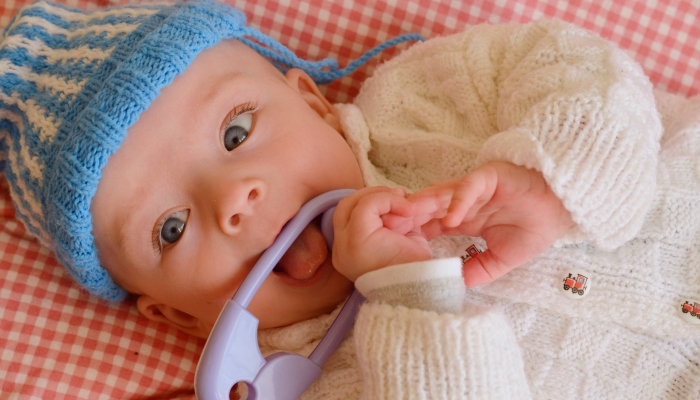
- Baby tongue chewing happens for many reasons and usually occurs between the ages of four to twelve months old.
- Most baby chewing tongue habits are completely normal and harmless. Your baby is simply learning how to use their tongue and mouth, and often, they find it comforting while teething.
- Consult your child’s pediatrician if your baby is displaying signs of difficulty eating, being distracted by their tongue chewing habit, or their tongue looks injured or abnormal.
- While some parents may feel concerned about the link between tongue chewing habits and individuals with autism, there is no affirmative link between ASD and tongue chewing in babies.
- Most babies learn to use their mouths by one year and stop tongue chewing. If your baby continues to chew on his tongue after twelve months old, you may want to consult his pediatrician.
If you’re asking why your baby is chewing on their tongue, rest assured that it’s a normal habit that most babies outgrow quickly. Your baby chewing on their tongue is generally not cause for concern, so long as your baby acts like their usual, content selves.
However, if you observe signs of chewing behavior looking abnormal – for example, if it seems like your baby’s tongue is getting in the way of him trying to eat – then contact your child’s pediatrician immediately.
We’re going to cover all you’ll need to know about why babies chew on their tongues, when to worry, and how to gently discourage this behavior.
Is It Normal for My Baby to Chew Their Tongue?
Your baby’s chewing tongue habit is completely normal most of the time, according to experts. The most common reason babies chew on their tongues is for amusement because they’ve just discovered a new thing they have to play with.
Most babies outgrow this harmless habit in just a few weeks, and it doesn’t harm them. If your baby is acting normal, then consider it normal. If your baby is acting distressed, check his mouth for foreign objects or abnormalities.
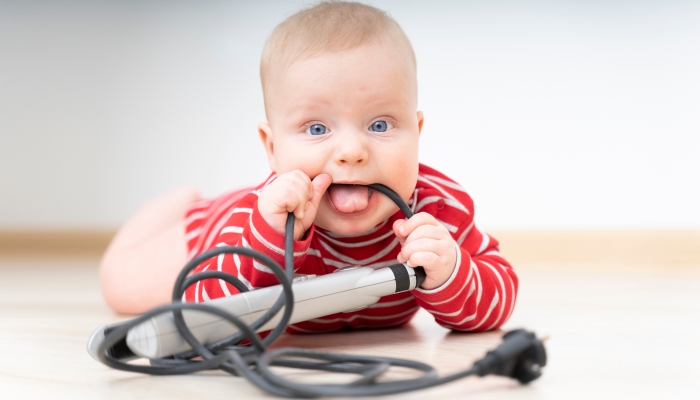
Why Do Babies Chew Their Tongues?
Babies chew on their tongues for several reasons. The most common causes include:
They’re Playing
Older babies mimic the behavior of adults, but there is some debate about whether babies less than six months are capable of this feat. In this Journal of Developmental Science report, researchers observed that newborn babies did show an ability to mimic sticking out their tongues as a form of play and communication.
Poor Muscle Tone in the Mouth
The tongue is a muscle, and babies have to strengthen and learn to control it just like they learn to use their arms or legs. Several conditions can cause or contribute to low muscle tone in infants.
This is something you should have examined by your child’s doctor if you think it could be affecting your child. Look for symptoms such as your baby having difficulty eating or breathing or if they are struggling to move and use their tongue effectively.
Having an Abnormally Large Tongue
Certain genetic conditions can cause an oversized tongue in children, which may interfere with chewing, breathing, and communication development.
Rather than fretting about it, get it examined in person by your child’s pediatrician if you feel that this is a possibility. Only a physician can conduct the necessary tests to rule out, or treat, a more complex condition.
It’s a Sucking Reflex
Babies have an instinctual reflex that causes them to make a sucking motion with their tongue and lips when they’re hungry. If you touch the roof of your baby’s mouth with a feeding nipple or pacifier, your baby will respond by sticking out his tongue and possibly making a chewing motion.
Babies have something called an extrusion reflex. This reflex is a survival technique in newborns that makes them compulsively reject and spit out anything that may be a choking hazard by sticking out their tongue. As your baby matures and gets ready for solid foods, this reflex disappears.
Teething
Your baby’s teeth may be causing pain and to self-soothe babies often chew on their hands, fingers, or anything soft they can find. Babies relieve teething pain by chewing on their ever-present, squishy tongues, as well.
If your teething baby is chewing due to pain, you will notice other signs like swollen gums, attempting to chew on everything, and excessive drooling.
If you feel that your baby is hurting his tongue with excessive chewing, offer him a teething toy. We have lots of helpful teething articles, including this one on brushing teeth and dental hygiene for disabled kids.
If you have oral concerns like your baby’s teeth are coming through in the wrong order, see a pediatric dentist.
Ready for Solid Foods
Around six months old, babies start to show readiness to eat solid foods, and many demonstrate hunger-related tongue chewing behavior. Around this time, babies lose their survival tongue thrust reflex, known as the extrusion reflex.
As your baby grows and continues to eat solids, the reflex decreases and allows them to eat heartier foods with ease. Your baby tongue chewing may also be him practicing the complex movements that he must master to learn to eat independently.
Babies around twelve months old have figured out how to move solid foods around in their mouth and swallow, thus reducing your baby’s tongue chewing habit.
Having a Smaller Mouth
There are several syndromes and genetic conditions that may predispose your baby to a smaller-than-average-sized mouth. Micrognathia, also known as “small jaw,” can have this symptom, as well as Down syndrome.
If you think that there may be a medical reason why your baby is chewing on their tongue, have them examined by a pediatrician. Often some treatments have the best results when put into practice sooner rather than later.
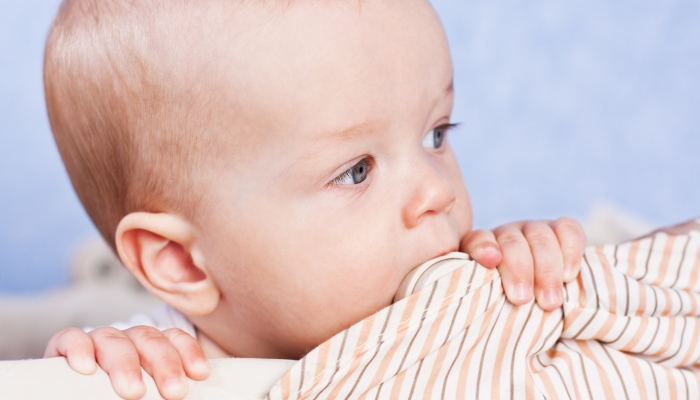
When to Worry About Your Baby’s Tongue Chewing
Your baby’s tongue chewing usually subsides after a few weeks and is seldom cause for concern. However, you should know what to look for and when to consult your child’s pediatrician.
- If your baby chewing on their tongue becomes a disruptive habit, lasting for many months or past one year old.
- If it disrupts or is a distraction while trying to eat
- If your baby shows signs of difficulty breathing
- If your baby is tongue biting with excessive force. You may want to brush up on strategies for self-injurious behavior for additional information.
- If the tongue appears injured or is bleeding
- If you notice a protruding tongue associated with constipation, cold skin, poor feeding, and low activity. These are symptoms of hypothyroidism in babies.
- If your baby’s tongue chewing appears abnormal in the tongue’s shape or position, or it’s causing your baby to chew it involuntarily.
Tips to Reduce Tongue Chewing
If you want to encourage your baby to use their mouths correctly and stop tongue chewing, try some of the following techniques and monitor your baby’s response.
- Use teething-friendly foods. Foods that offer comfort are safe and have a satisfying texture for babies. Examples of teething foods are a mango seed with pulp on it or a firm, peeled carrot. Store them in the refrigerator to reduce gum inflammation with this cool treat. Your baby will get used to the taste of healthy foods and learn to love them as he grows up. Your baby may prefer to avoid hard teething toys during this time.
- With your pediatrician’s permission, introduce solid food so that your baby can start chewing and learning how to use his tongue with a purpose. Many babies stop chewing on their tongues at this stage because they feel more satiated after eating solid food.
- Feed your baby on a schedule to reduce any tongue chewing that may be associated with hunger, a desire for attention, or boredom.
- Don’t try to force your baby to stop doing it. Most of the time, they’re just experimenting and playing. If you observe that it’s becoming an unhealthy or prolonged habit, then speak to your baby’s pediatrician.
Is Tongue Chewing a Sign of Autism?
Tongue thrusting and other oral behaviors are examples of stimming. This term describes the repetitive movements or noises children with autism spectrum disorder (ASD) often display as a coping mechanism in overstimulating environments.
Autism is a complex condition requiring multiple diagnostic testing processes conducted at different stages of a child’s life. While some individuals with autism may show signs of tongue chewing and lip biting, it is in no way an affirmative indication of ASD in infants.
Please speak to your child’s pediatrician for more information on autism and the symptoms and diagnosis for it if you’re concerned.

Other Teething FAQs
Why do babies put things in their mouths?
Oral exploration is a crucial developmental stage in your baby’s first year. Putting toys and other objects in their mouths is how babies learn about the world around them. They explore through tastes, textures, and sensations.
Pediatricians also say that gumming (chewing on) objects help babies soothe teething pain.
Can chew toys help prevent tongue chewing?
If you notice that your baby is tongue chewing while experiencing teething symptoms, like gum swelling and excessive salivating, offer teething toys to provide relief.
Many enjoy a soft teether placed in the freezer for a couple of hours to soothe your baby’s gums.
Why do babies bite themselves?
Babies may bite themselves to seek attention, self-soothe, or as a coping mechanism. Babies lack the verbal skills needed to express what’s happening and how they’re feeling, so they rely on their behavior to get the point across. Try to look for the underlying cause behind the behavior and identify if your baby is experiencing discomfort.
How do I stop my baby from biting themselves?
If you want to prevent your baby from biting themselves or chewing on their tongue, then distraction is key. Show them an interactive toy or book, look out the window, or take a walk outside.
There are always behaviors that coincide with your child biting themselves that can help guide you toward the root of the problem. Make sure to rule out that your baby isn’t hungry or experiencing a medical condition that should be looked at by a doctor.
If your toddler is biting themselves out of anger or during a meltdown, read this piece on toddler aggression.
Why is my baby chewing on his hands?
Most pediatricians say that babies chew on their hands simply because they have discovered them. Babies love to explore their world and their body, often using their mouths. Babies learn motor control by practicing putting their hands in their mouths and feeding themselves.
Most babies enjoy the sensation of chewing on their fingers and hands, especially while teething. If you feel like the behavior is becoming a bad habit for your little one, offer him plenty of distractions to keep his hands occupied.
Is it normal for a baby to bite themselves?
Countless children go through biting phases, usually between the ages of one to three years old. Most stop biting on their own, and it’s a regular part of childhood development.
Still, it is a habit that most parents want to discourage and monitor for signs of a more significant issue. If you’re concerned over a baby chewing tongue habit, see your child’s pediatrician for answers and peace of mind.
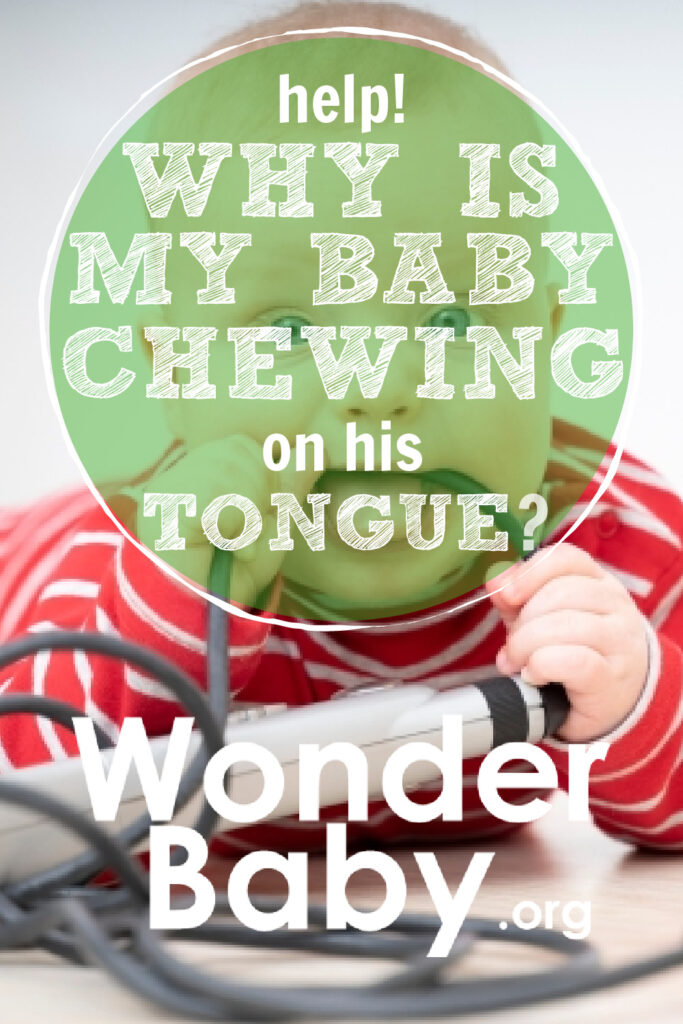
The information WonderBaby provides is not intended to be, and does not constitute, medical or other health advice or diagnosis and should not be used as such. Always consult with a qualified medical professional about your specific circumstances.
Related Posts
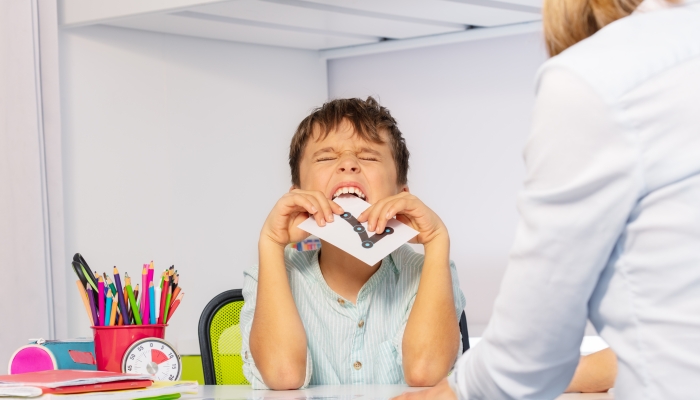
Behavior
Understanding Intermittent Explosive Disorder in Children
Are you worried about your child’s unexpected aggression and explosive behaviors? Learn how to support a child with intermittent explosive disorder.

Behavior
5 Emotional Regulation Activities for Kids
Want to teach your child how to regulate emotions? Here are emotional regulation activities for kids that can help!

Behavior, Special Needs
5 Tips for Dining Out with Children Who Have Sensory Sensitivities
Worried about dining out with sensory sensitivities? Try these tips for less stress and more fun the next time you take your family out to eat.